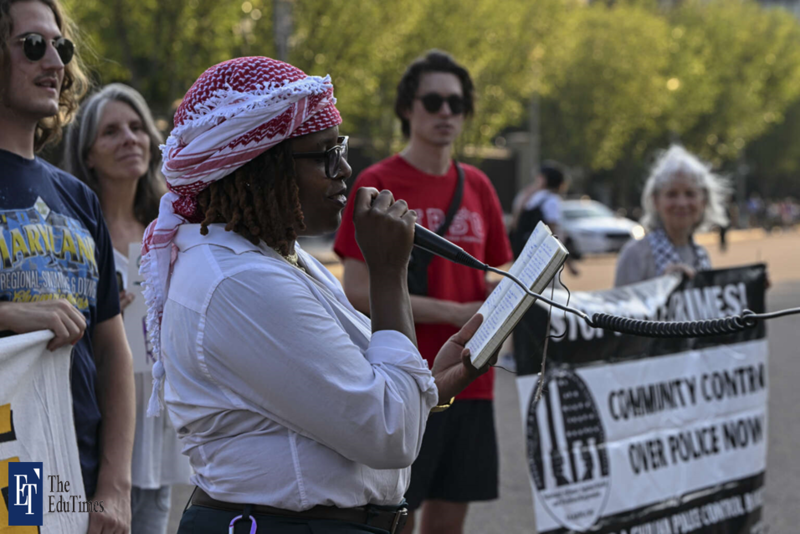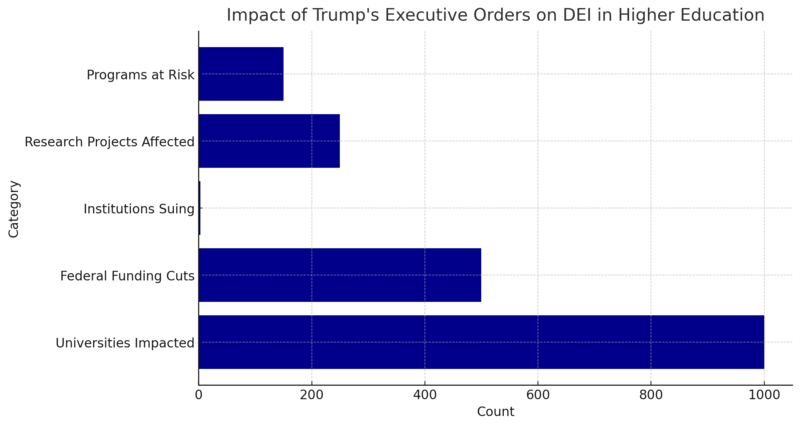AAUP and NADOHE Seek Injunction Against Trump’s Executive Orders Targeting DEI in Higher Education
Input
Modified
The National Association of Diversity Officers in Higher Education (NADOHE) and the American Association of University Professors (AAUP) have sued to block President Donald J. Trump's executive orders requiring universities and colleges to dismantle their diversity, equity, and inclusion (DEI) programs. The lawsuit contends that these mandates are unconstitutional and endanger academic freedom.

The Restaurant Opportunities Centers United and the Baltimore Mayor and City Council are also plaintiffs in the case, which was filed in the federal district court in Baltimore on February 3, 2025. The goal of the lawsuit is to stop these executive orders from being implemented in their respective jurisdictions.
The Executive Orders in Question
Shortly after assuming office for a second term, Trump issued two executive orders:
- The January 20, 2025, J20 Order, "Ending Radical Government DEI Programs and Preferencing," requires the cancellation of all federal funding and contracts pertaining to DEI.
- J21 Order: "Ending Illegal Discrimination and Restoring Merit-Based Opportunity" (January 21, 2025), which launches compliance investigations into universities with endowments over $1 billion and mandates that institutions attest to not promoting DEI programs.
The J21 Order, which the White House referred to as "the most comprehensive and important federal civil rights measure in decades," ends what it describes as "anti-constitutional and deeply demeaning 'equity' mandates" and restores "individual dignity, hard work, and excellence."
Opposition from Higher Education Leaders
NADOHE President and CEO Paulette Granberry Russell vehemently denounced the executive orders, saying they violate “the principles of diversity, equity, and inclusion and accessibility within the fabric of our federal government and beyond.” She also said the Trump administration’s actions create “an environment of fear and uncertainty,” forcing organizations to renounce their commitment to justice and equity.
AAUP and NADOHE argue that the executive orders represent an unconstitutional overreach, violating the rights of educational institutions and professionals engaged in diversity work. The lawsuit asserts that the orders violate multiple constitutional provisions:
- Article 1, Section 8: Grants Congress, not the President, the power to allocate federal funding and establish programs. The orders’ mandates to cut DEI-related grants and contracts overstep executive authority.
- The Fifth Amendment: The lawsuit contends that the orders are impermissibly vague, failing to define key terms such as “DEI,” “equity,” and “equity-related,” leaving institutions uncertain about compliance requirements.
- The First Amendment: The lawsuit argues that the orders impose viewpoint-based restrictions on free speech by discouraging the promotion of diversity and inclusion.
The Vagueness and Uncertainty of the Orders
The complaint draws attention to both directives' vague wording and unclear instructions. The J21 Order directs the Attorney General to look into institutions without defining the selection criteria, leaving colleges and universities unsure of their status. Similarly, the J20 Order directs agencies to stop awarding DEI-related grants “to the maximum extent allowed by law,” but it doesn’t define what constitutes “equity-related”.
According to the lawsuit, these executive orders have a "chilling effect" on universities, deterring conversations, curriculum development, and research on diversity, equity, and inclusion. Academic freedom is also threatened by the certification requirement that institutions refrain from DEI activities, since universities risk losing federal funds if their faculty or programs are found to be non-compliant.
Broader Implications for Higher Education and Civil Rights
Nearly 60 years of federal efforts to encourage diversity in recruiting and contracting are reversed by the J21 Order. Non-discriminatory hiring practices in federally sponsored projects have been guaranteed by affirmative action laws since President Lyndon B. Johnson's Executive Order 11246 in 1965. These safeguards are eliminated by Trump's order, which affects federal contractors, non-profits, and institutions.
In reaction to the executive orders, the National Institutes of Health (NIH), which provides funding for a large amount of university research, has already started to reduce awards related to DEI activities. These developments result in financial deficits for institutions like Johns Hopkins University and the University of California system, which raise questions about the long-term viability of academic research initiatives.
Advocates for education and legal professionals caution that the decrees may have far-reaching effects. According to national legal consulting company Morrison Forster, J21 represents “a sea change at the federal level on decades-old affirmative action and anti-discrimination requirements.” Institutions are uncertain about compliance and possible penalties in the absence of clear enforcement instructions.

Academic Leaders Respond
The executive orders, according to AAUP President Todd Wolfson, stifle scholarly debate, impede important health and social research, and widen societal divides for political ends.
There have already been reports of funding freezes and research project pauses impacting studies related to DEI. According to a recent University World News report, the new approach has made it harder for faculty in the social sciences, public health, and education to get government research funds. According to AAUP spokesman Kelly Benjamin, certain research programs are completely closing as a result of financial difficulties, while other universities are also seeing disruptions.
Legal and Political Implications
The plaintiffs will contend during the trial that Trump's executive orders violate constitutional rights and go beyond the scope of presidential authority. The complaint highlights that without congressional consent, the executive branch cannot unilaterally cut off funding or set restrictions. Furthermore, institutions are exposed to capricious enforcement due to the administration's vague and expansive wording.
The implementation of these executive directives will be stopped while legal proceedings are ongoing if the court granted the injunction. It is anticipated that this lawsuit would establish a precedent regarding the executive branch's bounds in determining civil rights safeguards and higher education policy.
Uncertain Future for DEI-Related Research
The future of research financing continues to be a major concern for many in the scientific community as universities and research organizations try to manage these developments. Researchers from a wide range of fields, including social studies and biomedical science, are concerned that the lack of clear criteria on the evaluation of DEI-related projects under the incoming administration may stifle vital investigations that seek to solve structural imbalances. Although the long-term effects of these regulations are yet unknown, the uncertainty has already had a negative impact on researchers like Kendra Dahmer, a postdoctoral researcher at the University of California, Berkeley. The administration's extensive DEI restrictions could endanger her work, which is supported by the National Institutes of Health (NIH).
As the case progresses, academic institutions, instructors, and students nationwide await a decision that will impact DEI initiatives going forward as well as the larger academic freedom environment in the US.





















